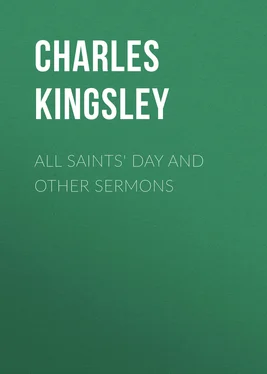Charles Kingsley - All Saints' Day and Other Sermons
Здесь есть возможность читать онлайн «Charles Kingsley - All Saints' Day and Other Sermons» — ознакомительный отрывок электронной книги совершенно бесплатно, а после прочтения отрывка купить полную версию. В некоторых случаях можно слушать аудио, скачать через торрент в формате fb2 и присутствует краткое содержание. Издательство: Иностранный паблик, Жанр: foreign_prose, foreign_religion, Философия, foreign_psychology, foreign_antique, на английском языке. Описание произведения, (предисловие) а так же отзывы посетителей доступны на портале библиотеки ЛибКат.
- Название:All Saints' Day and Other Sermons
- Автор:
- Издательство:Иностранный паблик
- Жанр:
- Год:неизвестен
- ISBN:нет данных
- Рейтинг книги:4 / 5. Голосов: 1
-
Избранное:Добавить в избранное
- Отзывы:
-
Ваша оценка:
- 80
- 1
- 2
- 3
- 4
- 5
All Saints' Day and Other Sermons: краткое содержание, описание и аннотация
Предлагаем к чтению аннотацию, описание, краткое содержание или предисловие (зависит от того, что написал сам автор книги «All Saints' Day and Other Sermons»). Если вы не нашли необходимую информацию о книге — напишите в комментариях, мы постараемся отыскать её.
All Saints' Day and Other Sermons — читать онлайн ознакомительный отрывок
Ниже представлен текст книги, разбитый по страницам. Система сохранения места последней прочитанной страницы, позволяет с удобством читать онлайн бесплатно книгу «All Saints' Day and Other Sermons», без необходимости каждый раз заново искать на чём Вы остановились. Поставьте закладку, и сможете в любой момент перейти на страницу, на которой закончили чтение.
Интервал:
Закладка:
But if it be so—and so it is—what must we be, to be fit to appear before Him who is Purity itself?—before that spotless Christ in whom is no sin and who knows what is in man; who is quick and piercing as a two-edged sword, even to the dividing asunder of the joints and marrow, so that all things are naked and open in the sight of Him with whom we have to do? What purity can we bring into His presence which will not seem impure to Him? What wisdom which will not seem folly? What humility which will not seem self-conceit? What justice which will not seem unjust? What love which will not seem hardness of heart, in the sight of Him who charges His angels with folly, and the very heavens are not clean in His sight? Who loved Him better, and whom did He love better, than St John? Yet, what befel St John when, in the spirit, he saw Him even somewhat as He is?—“And I fell at His feet as dead.” If St John himself was struck down with awe, what shall we feel, even the best and purest among us? All we can do is to cast ourselves, now and for ever, in life, in death, and in the day of judgment, on His boundless mercy and love—who stooped from heaven to die for us and cry, God be merciful to me a sinner.
Therefore, I have many fears for some who are ready enough to talk of their fulness of hope and their assurance of salvation, and to join in hymns which express weariness of this life and longings for the joys of heaven, and prayers that they may depart and be with Christ. If they are not in earnest in such words they mock God; but if they are in earnest, some of them, I fear much, tempt God. What if He took them at their word? What if He gave them their wish? What if they departed and entered the presence of Christ, only to meet with a worse fate than that of Gerontius? Only to be overwhelmed with shame and terror, because, though they have been talking of being with Christ, they have not been trying to be like Christ; because they have not sought after holiness, without which no man shall see the Lord; because they have not tried to purify themselves, even as He is pure; and have, poor, heedless souls, gone out of the world, with all their sins upon their head, to enter a place for which they will find themselves utterly unfit, because it is a place into which nothing can enter which defileth, or committeth abomination, or maketh a lie, and from which the covetous are specially excluded; and in which will be fulfilled the parable of the man who came to the feast, not having on a wedding garment,—Take him, bind him hand and foot, and cast him into the outer darkness. There shall be wailing and gnashing of teeth.
Assurance, my friends, may be reasonable enough when it is founded on repentance and hatred of evil, and love and practice of what is good. But, again, assurance may be as unreasonable as it is offensive. We blame a man who has too much assurance about earthly things. Let us beware that we have not too much assurance about heavenly things. For our assurance will surely be too great, unreasonable, built upon the sand, if it be built on mere self-conceit of our own orthodoxy, and our own privileges, or our own special connection with God.
Meanwhile it has been my comfort to meet with some—would God they were more numerous—who, instead of talking of their assurance of salvation, lived in a state of noble self-discontent and holy humility; who could see nothing but their own faults and failings; who, though they were holier than others, considered themselves as unholy; though they were doing more good than others, thought themselves useless; whose standard of duty was so lofty, that they could think of nothing, but how far they had failed in reaching it; who measured themselves, not by other men, but by Christ Himself; and, doing that, had nought to say, save, “God be merciful to me a sinner.” And for such people I have had full assurance, just because they had no assurance themselves. And I have said in my heart, These are worthy, just because they think themselves unworthy. These are fit to appear in the presence of God, just because they believe themselves unfit. These are they who will cry at the day of judgment, in wondering humility,—Lord, when saw we Thee hungry, or thirsty, or naked, or in prison, and visited Thee? And will receive for answer,—“Inasmuch as ye have done it unto one of the least of these my brethren, ye have done it unto Me.” “Thou hast been faithful over a few things, I will make thee ruler over many things. Enter into the joy of thy Lord.”
To which end may God of His mercy bring us, and all we love. Amen.
SERMON IV. THE LORD COMING TO HIS TEMPLE
Westminster Abbey. November , 1874.
Malachi iii. 1, 2. “The Lord, whom ye seek, shall suddenly come to His temple. . . . But who may abide the day of His coming? and who shall stand when He appeareth? for He is like a refiner’s fire, and like fuller’s sope.”
We believe that this prophecy was fulfilled at the first coming of our Lord Jesus Christ. We believe that it will be fulfilled again, in that great day when He shall judge the quick and the dead. But it is of neither of these events I wish to speak to you just now. I wish to speak of an event which has not (as far as we know) happened; which will probably never happen; but which is still perfectly possible; and one, too, which it is good for us to face now and then, and ask ourselves, If this thing came to pass, what should I think, and what should I do?
I shall touch the question with all reverence and caution. I shall try to tread lightly, as one who is indeed on hallowed ground. For the question which I have dared to ask you and myself is none other than this—If the Lord suddenly came to this temple, or any other in this land; if He appeared among us, as He did in Judea eighteen hundred years ago, what should we think of Him? Should we recognise, or should we reject, our Saviour and our Lord? It is an awful thought, the more we look at it. But for that very reason it may be the more fit to be asked, once and for all.
Now, to put this question safely and honestly, we must keep within those words which I just said—as He appeared in Judea eighteen hundred years ago. We must limit our fancy to the historic Christ, to the sayings, doings, character which are handed down to us in the four Gospels; and ask ourselves nothing but—What should I think if such a personage were to meet me now? To imagine Him—as has been too often done—as doing deeds, speaking words, and even worse, entertaining motives, which are not written in the four Gospels, is as unfair morally, as it is illogical critically. It creates a phantom, a fictitious character, and calls that Christ. It makes each writer, each thinker—or rather dreamer—however shallow his heart and stupid his brain—and all our hearts are but too shallow, and all our brains too stupid—the measure of a personage so vast and so unique, that all Christendom for eighteen hundred years has seen in Him, and we of course hold seen truly, the Incarnate God. No; we must think of nothing save what is set down in Holy Writ.
And yet, alas! we cannot use in our days, that which eighteen hundred years ago was the most simple and obvious test of our Lord’s truthfulness, namely His miraculous powers. The folly and sin of man have robbed us of what is, as it were, one of the natural rights of reasoning, man. Lying prodigies and juggleries, forged and pretended miracles, even—oh, shame!—imitations of His most sacred wounds, have, up to our own time, made all rational men more and more afraid of aught which seems to savour of the miraculous; till most of us, I think, would have to ask forgiveness—as I myself should have to ask,—if, tantalized and insulted again and again by counterfeit miracles, we failed to recognise real miracles, and Him who performed them. Therefore, for good or evil, we should be driven back upon that test alone, which, after all, perhaps, is the most sure as well as the most convincing—the moral test—the test of character. What manner of personage would He be did He condescend to appear among us? Of that, thank God, the Gospels ought to leave us in no doubt. What acts He might condescend to perform, what words He might condescend to speak, it is not for such beings as we to guess. But how He would demean Himself we know; for Holy Writ has told us how He demeaned Himself in Judea eighteen hundred years ago; and He is the same yesterday, to-day, and for ever, and can be only like Himself. But should we know Him merely by His bearing and character? Should we see in Him an utterly ideal personage—The Son of Man, and therefore, ere we lost sight of Him once more, the Son of God? Let us think. First, therefore, we must believe that—as in Judea of old—Christ would meet men with all consideration and courtesy. He would not break the bruised reed, nor quench the smoking flax. He would not strive, nor cry, nor let His voice be heard in the streets. He would not cause any of God’s little ones to offend, to stumble. In plain words, He would not shock and repel them by any conduct of His. Therefore, as in Judea of old, He would be careful of, even indulgent to, the usages of society, as long as they were innocent. He would never outrage the code of manners, however imperfect, however conventional, which this or any other civilised nation may have agreed on, to express and keep up respect, self-restraint, delicacy, of man toward man, of man toward woman, of the young ward the old, of the living toward the dead. No.
Читать дальшеИнтервал:
Закладка:
Похожие книги на «All Saints' Day and Other Sermons»
Представляем Вашему вниманию похожие книги на «All Saints' Day and Other Sermons» списком для выбора. Мы отобрали схожую по названию и смыслу литературу в надежде предоставить читателям больше вариантов отыскать новые, интересные, ещё непрочитанные произведения.
Обсуждение, отзывы о книге «All Saints' Day and Other Sermons» и просто собственные мнения читателей. Оставьте ваши комментарии, напишите, что Вы думаете о произведении, его смысле или главных героях. Укажите что конкретно понравилось, а что нет, и почему Вы так считаете.












